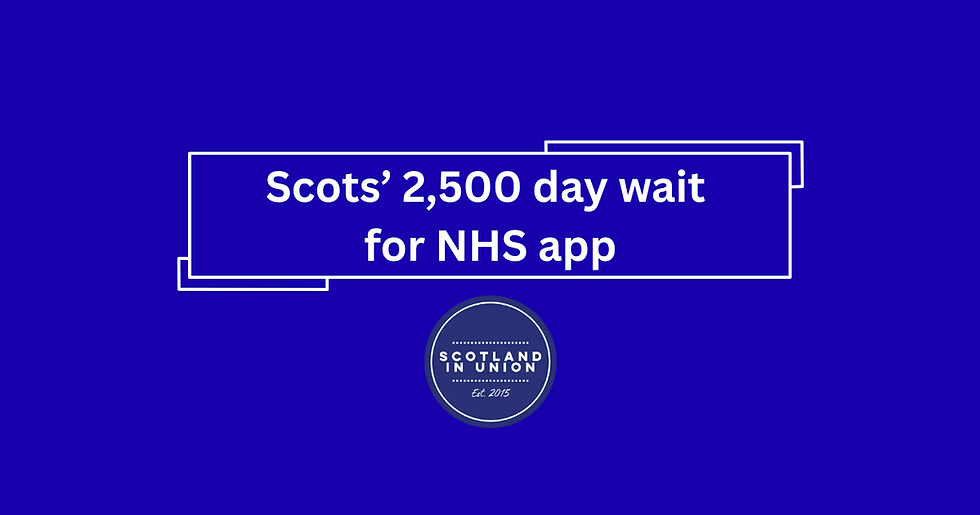Andrew Skinner: EU questions the SNP STILL need to answer
- Nov 17, 2023
- 4 min read
Updated: Feb 5, 2024
In Scotland under the SNP we have become accustomed to politicians asserting what they want (and hope) to happen, but not what they know will happen.
This approach has been an SNP mainstay for years when talking about the consequences of Scotland leaving the UK, be it on currency, pensions, borders, central bank, and EU membership, to name just a few recent examples.
Today the SNP have published a new white paper on 'an independent Scotland in the EU' which touches on some of these topics.
The paper has told us nothing new. We know this because there has been no official negotiations on an independent Scotland applying to join the EU with the SNP Government and the European Commission - because Scotland is part of the UK.
The EU cannot (and will not) negotiate membership with any part of any country unless it is fully independent and declared internationally as such (and recognised by all EU member states). Only then can you apply to become an applicant/candidate country (not a member state), and then join the line of other nations who are also seeking to join.
The paper repeatedly mentions Scotland ‘re-joining the EU’ when in fact Scotland has never been a member-state of the EU in its own right. This phrase is of course used intentionally to give the impression that it is easy to join. That is simply not the case.
“Becoming a member of the EU is a complex procedure which does not happen overnight.” says the European Union.
Even if a separate Scotland was to join it would not be joining on the same basis and same rules that we enjoyed under the UK’s membership. There are no vetoes or opt outs for new member states. You must comply with existing protocols and rules.
It is also important to highlight that the concept of opt-outs (and vetoes) is typically associated with existing member states negotiating specific exemptions or special arrangements after they are already EU members. A separate Scotland will not be in this position.
For example, “As most Schengen rules are now part of the EU acquis, it has no longer been possible, since the EU enlargement of 1 May 2004, for accession countries to ‘opt out’ (Article 7 of the Schengen Protocol)”.
A separate Scotland alone will not get to decide international agreements. If Scotland is part of the EU and thus part of Schengen then this creates a scenario where the EU and the UK would decide what agreement is in place (or not).
Another point of contention rarely mentioned is that an independent Scotland could potentially find itself using three separate currencies along the path to becoming a full member state of the EU; the British pound that we use now, and will continue to do so in a transitional period until a newly created Scottish pound is up and running. And once a member state of the EU our acceptance of the euro would mean another change further down the line.
Anthony Salamone, a leading Scottish political scientist says in his speech in February of this year: “On the euro, I see no reasonable prospect for an opt-out for Scotland or any other candidate or potential candidate to join the EU.”
It is worth mentioning that member states have some control when it comes to the timeframe of euro adoption, however measures are met beforehand like currency alignment and other measures to ensure Scotland is euro ready. It can be delayed but committing to eventually join the euro is something we would have to accept.
No country has ever joined the EU explicitly stating a refusal to adopt the euro before the accession negotiations.
After this weeks release here are ten questions that STILL need to be answered honestly by the SNP:
1. Would there be a referendum on joining the EU?
2. How many years would it be expected to take from the point of separation to the point of accession?
3. Would a separate Scotland make the required commitment to join the euro in good faith and, if so, how long would it use the pound and how long would it then use a separate Scottish currency before joining the euro, and what impact would these changes have on mortgages and pensions?
4. If Scotland secured the agreement of Ireland and the remainder of the UK to join the Common Travel Area, would it agree not to diverge significantly on immigration policy?
5. It would not be possible for a separate Scotland to be part of both the Common Travel Area and the Schengen borderless zone. Would Scotland seek an opt-out from the Schengen borderless zone and how would it convince EU institutions to legislate for this?
6. If Scotland is not granted an opt-out from the Schengen borderless zone, would Scotland proceed with an application to the EU given a hard border would then need to be established between Scotland and England?
7. How would Scotland construct the required border controls on goods, and what impact would leaving the UK internal market have on Scottish businesses given the rest of the UK is by far our largest trading partner (60 per cent of trade)?
8. What would be Scotland’s budget contribution to the EU?
9. How would Scotland go about planning to reduce its deficit to the required three per cent of GDP given it currently stands at nine per cent?
10. What would be the impact on the fishing industry of a separate Scotland handing some control over its waters to the EU and joining the Common Fisheries Policy?
If the SNP fails to be honest with voters and answer these questions and many more, then this must be the very last time the SNP wastes public money on its constitutional obsession.
Scotland deserves better.





Comments